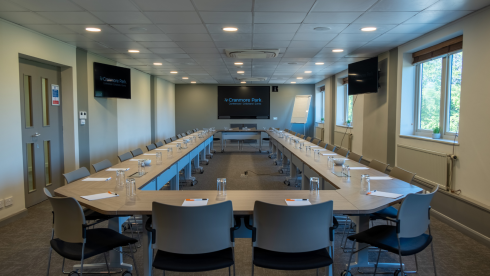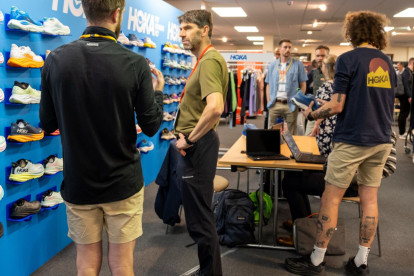Top tips | Planning a successful conference
16 Apr, 2025 - 8 min read
If you're organising a business conference, you want the event to be the very best it can be. But how can you make it stand out from rival conferences and be the best experience possible? People attending conferences won't often remember the average conferences, so you need to shine in a busy and competitive environment.
You want people to be competing for places at the conference next year, and this means providing a great experience and developing a positive reputation for the event. There are many steps you can take in the planning process to ensure your conference is a success and, in this blog, we’ll look at how you can deliver a great conference and ensure it becomes a hot topic of conversation in your industry sector.
Set Goals and Objectives
What do you want to achieve with your conference? Are you trying to increase brand awareness, generate leads, or educate your attendees? Once you know your goals, you can start to develop a plan to achieve them. As well as your goals and objectives, you’ll also need to consider key factors such as:
Audience
Who are you trying to reach with your conference? What are their interests and needs? Without knowing this key information, you can’t move forward with planning your conference. By determining the answers to the above questions, you can then begin to tailor your content and speakers to their interests.
Budget
It’s important to figure out how much you have to spend on planning and implementing a conference as you may have to work within financial restrictions. Determining a budget early on can help guide your decision on what speaker you can recruit, catering options and even the date of the conference.
Theme and format
What are the big talking points within the industry? Or the issues which aren't being addressed, but need to be? Your conference needs to be relevant to recent, current or future developments within the industry sector you are working in. Visitors need to see value in attending, learning from speeches, workshops and seminars, and networking with others in the context of the conference theme.
It’s also important to select the right format for your conference. Examples of this include considering roundtables, trade shows, seminars Q&As and workshops.
How to Choose the Best Conference Venue
When it comes to choosing a venue, there are several things you should be thinking about, many of which are easy to miss. Think about factors such as how will people get to your conference. Does the venue have adequate transport links? What are the options for catering? Will the venue be able to assist with catering? So many questions to ask! Below we’ll delve further into factors to consider when selecting your conference venue.
Transport Links for Your Conference Venue
It’s safe to say that a conference is nothing without attendees, so you need to make it as easy as possible for many people to get there. As such, you must choose a venue with good transport links. If you know your audience or have run a conference show previously, then you’ll have a good idea of the location where they travel from. Whilst it’s impossible to ensure that all visitors don’t have a long journey, you can do your best to select a conference venue that is central to all visitors. It’s a good idea to look for a venue close to a train station, motorway junction or if you’re expecting visitors from overseas, an airport.
Conference Venue Size
Whilst the location is extremely important for accessibility, the size of the conference venue is also an important factor to consider. Your conference needs to be in a suitably sized, fit-for-purpose facility, which gives you various design and set-up options and must be able to customise the site to suit the specific needs of the conference. The facility should be well-equipped with technology, have great catering facilities and the furniture should be comfortable too. Be sure to ask the venue about what will be provided for you in the conference rooms. For example, you might need a projector or a microphone and whilst most venues will be happy to provide these, you may have to ask rather than assuming they will be there! It's better to be safe than sorry.
Catering Requirements
If your conference is going on for much longer than a few hours, as most of them do, you will need to think about food and drink. Most venues will have the capability to provide this, but it is something you should check beforehand. You should also make sure anyone with any dietary requirements, such as veganism or a food allergy, is provided for. Again, you should contact the venue beforehand to make sure this is okay.
Seek Help from Others When Planning a Conference
If you're planning a conference for the first time, you might not realise what a big job you've undertaken. Even if it's going to be a relatively manageable event in terms of numbers on the day, or throughout the event, there's still an awful lot of preparation to be done in advance. To be completely honest, it’s a job for a team of people rather than an individual! Naturally, you want to make the best possible impression on everyone who attends, to build a strong reputation which will stand you and your organisation in good stead in the future.
As the organiser, you need to compile a comprehensive list of tasks to be completed before, during and after the conference. This will include finance and budgeting, event planning, marketing and publicity, networking and catering. You simply can't do everything on your own. This is why it's important to surround yourself with a team of good people who can share the load. They might be employees or even volunteers; all that matters is they understand the vision for the conference and what you are trying to achieve. It makes sense to delegate certain roles and responsibilities to people on the events committee, allowing them to focus on one or two specific areas. This helps to ensure that all the 'i's are dotted and the 't's are crossed. You don't want people to start arriving and then find there has been a major oversight.
Using Social Media to Plan your Conference
Using social media to plan your conference can be a simple but effective tool. Quite often, people within the industry your conference will resonate with will post on social channels such as LinkedIn with their opinions on what’s happening in the industry. Some organisations regulate certain industries, which provide updates to new legislation, and these can sometimes cause backlash. By keeping up to date with what industry experts are saying online, you can prepare for potential questions that may be asked during your Q&A session and potentially avoid not knowing how to answer certain questions.
You can also use social media to research your speakers or find out what people in the industry are saying about them. For example, they may be well known for a newly published book or a guest appearance on TV which will help give an insight into what they are about.
However, if you’re using social media to reach out to people, maybe those who have registered, then be careful not to spam anyone or you could put them off attending your conference. Using your company's social platforms to promote your conference can help raise awareness.
Speakers and Agenda Creation
Are you going to include a speaker? It might sound like a bizarre question but not all conferences feature a speaker. This could be down to several factors, for example, the conference budget might not allow it or the availability of a relevant speaker might be low. To avoid the disappointment of not being able to book the perfect speaker for your conference, decide early in the planning stage.
The success of a conference depends on the quality of its speakers and the relevance of the agenda. Handpicking keynote speakers and structuring engaging sessions demand thorough attention. Attempt to source a speaker that is highly sought after or well known in the industry as sourcing a low-budget speaker can backfire on you in the long run. If your audience experiences a conference with a low-quality speaker, then they are less likely to return to future events.
Cranmore Park - A Conference Venue Like No Other
If you’re planning a conference and are looking for the perfect venue, then look no further than Cranmore Parl. Our expert events team are on hand to ensure your conference is planned to perfection from start to finish. This purpose-built venue in Solihull is perfect for exhibitions, conferences, meetings, trade shows and more! To find out more contact us today by calling 0121 713 4450 or emailing info@cranmorepark.co.uk.


